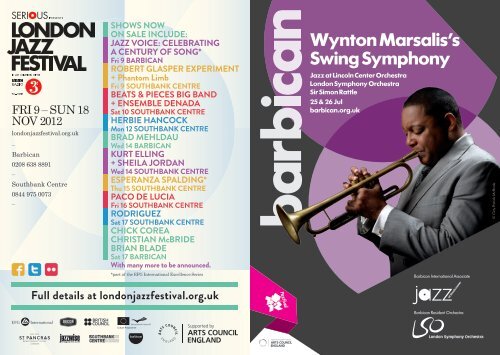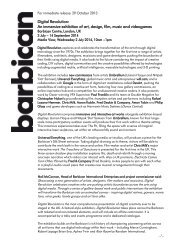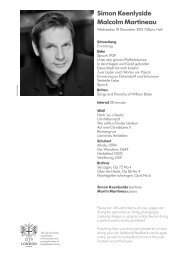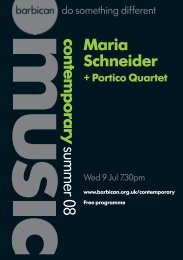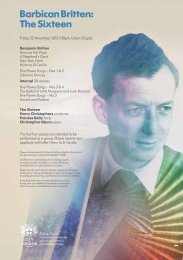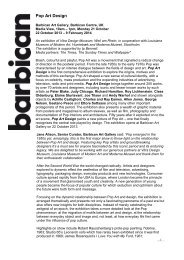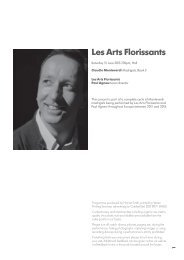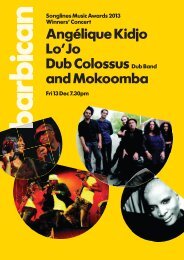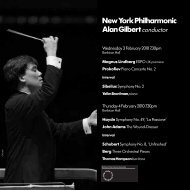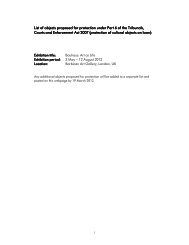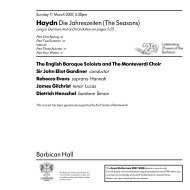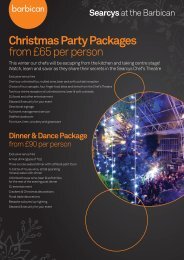Wynton Marsalis's Swing Symphony - Barbican
Wynton Marsalis's Swing Symphony - Barbican
Wynton Marsalis's Swing Symphony - Barbican
You also want an ePaper? Increase the reach of your titles
YUMPU automatically turns print PDFs into web optimized ePapers that Google loves.
FRI 9 – SUN 18<br />
NOV 2012<br />
londonjazzfestival.org.uk<br />
–<br />
<strong>Barbican</strong><br />
0208 638 8891<br />
–<br />
Southbank Centre<br />
0844 975 0073<br />
–<br />
SHOWS NOW<br />
ON SALE INCLUDE:<br />
JAZZ VOICE: CELEBRATING<br />
A CENTURY OF SONG*<br />
Fri 9 BARBICAN<br />
ROBERT GLASPER EXPERIMENT<br />
+ Phantom Limb<br />
Fri 9 SOUTHBANK CENTRE<br />
BEATS & PIECES BIG BAND<br />
+ ENSEMBLE DENADA<br />
Sat 10 SOUTHBANK CENTRE<br />
HERBIE HANCOCK<br />
Mon 12 SOUTHBANK CENTRE<br />
BRAD MEHLDAU<br />
Wed 14 BARBICAN<br />
KURT ELLING<br />
+ SHEILA JORDAN<br />
Wed 14 SOUTHBANK CENTRE<br />
ESPERANZA SPALDING*<br />
Thu 15 SOUTHBANK CENTRE<br />
PACO DE LUCIA<br />
Fri 16 SOUTHBANK CENTRE<br />
RODRIGUEZ<br />
Sat 17 SOUTHBANK CENTRE<br />
CHICK COREA<br />
CHRISTIAN McBRIDE<br />
BRIAN BLADE<br />
Sat 17 BARBICAN<br />
With many more to be announced.<br />
*part of the EFG International Excellence Series<br />
Full details at londonjazzfestival.org.uk<br />
<strong>Wynton</strong> Marsalis’s<br />
<strong>Swing</strong> <strong>Symphony</strong><br />
Jazz at Lincoln Center Orchestra<br />
London <strong>Symphony</strong> Orchestra<br />
Sir Simon Rattle<br />
25 & 26 Jul<br />
barbican.org.uk<br />
<strong>Barbican</strong> International Associate<br />
<strong>Barbican</strong> Resident Orchestra<br />
London <strong>Symphony</strong> Orchestra<br />
© Clay Patrick McBride
9 – 18 Nov<br />
London<br />
Jazz Festival<br />
in association<br />
with BBC<br />
Radio 3<br />
Highlights<br />
include<br />
Fri 9 Nov<br />
Jazz Voice –<br />
Celebrating A<br />
Century of Song<br />
The Festival’s signature openingnight<br />
gala returns once again with<br />
its epoch-spanning celebration<br />
of singing and song<br />
Sat 17 Nov 2pm<br />
Neil Cowley Trio<br />
with the Goldsmiths<br />
(big) Strings<br />
A special Festival matinee,<br />
featuring an exclusive orchestral<br />
rendition of blazingly original<br />
pianist and composer Neil<br />
Cowley’s acclaimed 2012 album,<br />
The Face of Mount Molehill<br />
barbican.org.uk<br />
Sun 18 Nov<br />
David Murray Big<br />
Band & Macy Gray<br />
Stomping And<br />
Singin’ The Blues<br />
Drenched in blues and soul,<br />
the closing night of the Festival<br />
features a special set of covers and<br />
timeless classics from soul singer<br />
Macy Gray and saxophone<br />
virtuoso David Murray<br />
Also booking<br />
Fri 8 Feb 2013<br />
Ahmad Jamal<br />
As influential as Jelly Roll Morton,<br />
Art Tatum or Thelonious Monk,<br />
the master jazz pianist presents<br />
his new album, Blue Moon<br />
Welcome to<br />
the City of London<br />
Corporation<br />
Virtuoso on<br />
the world stage<br />
The City of London Corporation is a uniquely diverse<br />
organisation that supports and promotes the City as the<br />
world leader in international finance and business services.<br />
It serves the needs of international business and<br />
maintains the environment in which organisations<br />
from all over the world can play their part in<br />
financing global trade and development.<br />
The City Corporation also provides modern, efficient<br />
and high quality local services and policing for those<br />
working in, living in and visiting the Square Mile.<br />
In addition it provides valued services beyond<br />
the Square Mile, including its role as one of the<br />
most significant arts sponsors in the UK – only the<br />
government, the BBC and the Lottery give more.<br />
The City of London is the founder and<br />
principal funder of the <strong>Barbican</strong> Centre<br />
www.cityoflondon.gov.uk<br />
1
Introduction<br />
It is a great pleasure to welcome back the<br />
Jazz at Lincoln Center Orchestra with<br />
Artistic Director <strong>Wynton</strong> Marsalis to the<br />
<strong>Barbican</strong> Centre.<br />
As our first International Associates in 2010 they<br />
made a huge impact on audiences, creating a real<br />
residency that extended beyond the <strong>Barbican</strong> into<br />
East London. This year we have presented an even<br />
more ambitious residency which gives audiences the<br />
opportunity to experience some of America’s finest<br />
jazz musicians in concerts, workshops, masterclasses<br />
and talks.<br />
This residency forms a highlight of the <strong>Barbican</strong>’s<br />
major contribution to the London 2012 Festival, with<br />
<strong>Swing</strong> <strong>Symphony</strong> taking place on the two nights<br />
preceding the opening ceremony of the Olympic<br />
Games. There have already been many outstanding<br />
events, ranging from Congo Square, written by<br />
Marsalis with Ghanaian drum master Yacub<br />
Addy, to the Abyssinian Mass, a hugely ambitious<br />
choral work by Marsalis which brought together<br />
the orchestra with a sixty-voice choir including the<br />
London Adventist Chorale, and the Croydon SDA<br />
Gospel Choir – an ideal collaboration between<br />
international and local talent at the highest level.<br />
Tonight’s concert in particular promises to be a<br />
landmark performance, with an unparalleled<br />
group of world-class musicians on stage together,<br />
as the Jazz at Lincoln Center Orchestra is joined<br />
by our resident orchestra, the London <strong>Symphony</strong><br />
Orchestra, and Berlin Philharmonic Chief Conductor,<br />
Sir Simon Rattle.<br />
It is a privilege for us at the <strong>Barbican</strong> Centre to<br />
partner these outstanding organisations and we<br />
are very grateful to all our supporters for making<br />
this possible. We hope you can join us as we draw<br />
the pre-Olympic period – which has provided<br />
so many thrilling cultural events in London – to a<br />
triumphant climax!<br />
Enjoy!<br />
Sir Nicholas Kenyon<br />
Managing Director of the <strong>Barbican</strong> Centre<br />
Supported by Arts Council England,<br />
the City Bridge Trust and the SHM Foundation<br />
This programme<br />
is printed on 100%<br />
recycled materials.<br />
The City of London<br />
Corporation is founder<br />
and principal funder of<br />
the <strong>Barbican</strong> Centre<br />
Programme notes<br />
Sergei Rachmaninov (1873–1943)<br />
Symphonic Dances Op 45 (1940)<br />
1 Non allegro<br />
2 Andante con moto (Tempo di valse)<br />
3 Lento assai – Allegro vivace<br />
Did Rachmaninov realise that the Symphonic<br />
Dances would be his last work? Whether he had<br />
such a premonition or not, few composers have<br />
ended their careers with such appropriate music,<br />
for the Symphonic Dances contain all that is finest<br />
in Rachmaninov, representing a compendium of a<br />
lifetime’s musical and emotional experience.<br />
Their composition was preceded by a big public<br />
retrospective of his triple career as composer,<br />
pianist and conductor. On 11 August 1939<br />
Rachmaninov gave his last performance in Europe<br />
and shortly afterwards left with his family for the US,<br />
one of many artists driven from Europe by the<br />
approach of war. In the following winter season the<br />
Philadelphia Orchestra gave five all-Rachmaninov<br />
concerts in New York to mark the 30th anniversary<br />
of his American debut (in 1909 he had premiered<br />
his Third Piano Concerto in New York, first with<br />
Walter Damrosch and then with Gustav Mahler<br />
conducting); Rachmaninov appeared as pianist<br />
and conductor.<br />
In the summer of 1941 he wrote to Eugene<br />
Ormandy offering him and the Philadelphia<br />
Orchestra the first performance of three ‘Fantastic<br />
Dances’; when the orchestration was completed<br />
two months later, the title had been finalised as<br />
‘Symphonic Dances’. The work exists in two versions:<br />
for large orchestra, and for two pianos.<br />
Rachmaninov was usually reluctant to talk about his<br />
music, and so we know almost nothing about the<br />
background to the composition of the Symphonic<br />
Dances. We do know that other of his works owe<br />
their existence to some visual or literary stimulus –<br />
The Isle of the Dead, for example, or several of the<br />
Etudes-tableaux for solo piano, and it is highly likely<br />
that the composer invested the Symphonic Dances<br />
with a poetic and even autobiographical<br />
significance which we can guess at, but which he<br />
never divulged. One clue is perhaps provided by<br />
the titles which he suggested for each movement.<br />
Since Mikhail Fokine had devised a successful ballet<br />
using the score of the ‘Paganini’ Rhapsody (Covent<br />
Garden 1939), a further collaboration was now<br />
suggested. Rachmaninov played the Symphonic<br />
Dances to the choreographer, and explained that<br />
they followed the sequence Midday – Twilight –<br />
Midnight.<br />
The first dance is a three-part structure, with fast<br />
outer sections. It is marked by an extraordinary<br />
and at times even eccentric use of the orchestra.<br />
After the stamping opening section, with its use of<br />
the piano as an orchestral instrument and piercingly<br />
strident woodwind calls, the central section offers<br />
gently undulating woodwind lines against which<br />
appears a great Rachmaninov melody given at first<br />
to a solo alto saxophone – an eerie, melancholy<br />
sound, unique in his music.<br />
Towards the end of this first dance a calm spreads<br />
over the music, with a broad new theme in the<br />
strings against a chiming decoration of flute,<br />
piccolo, piano, harp and bells, a quotation from his<br />
ill-fated First <strong>Symphony</strong>, withdrawn (and the score<br />
apparently lost) after its disastrous first and only<br />
2 3
performance in 1897. The failure of this work had<br />
been a crippling blow to the young composer, who<br />
for some years afterwards had been incapable<br />
of further composition. There is no knowing what<br />
private significance this quotation now had for<br />
Rachmaninov at the end of his life. Was it an<br />
exorcism, perhaps, or a recollection of the early<br />
love affair that had lain behind the <strong>Symphony</strong>?<br />
A snarl from the brass opens the second of the<br />
dances. This is a symphonic waltz in the tradition<br />
of Berlioz, Tchaikovsky and Mahler; and as in<br />
movements by those composers, the waltz, that<br />
most social and sociable of dances, at times takes<br />
on the character of a danse macabre. The title<br />
‘Twilight’ is perfectly suited to this shadowy music,<br />
haunted by spectres of the past.<br />
In the third dance, the theme from the First<br />
<strong>Symphony</strong> has a further significance when the<br />
first four notes form the first notes of the Dies irae<br />
plainchant, that spectre of death which haunts so<br />
much of Rachmaninov’s music. Once again, a threepart<br />
structure, the central section is imbued with a<br />
lingering, fatalistic chromaticism; the outer sections,<br />
by contrast, contain some of the most dynamic<br />
music Rachmaninov ever wrote. Another significant<br />
self-quotation is the appearance of a chant from<br />
the Russian Orthodox liturgy which Rachmaninov<br />
had set in his 1915 All-Night Vigil (usually referred to<br />
as the Vespers). This chant and the Dies irae engage<br />
in what is virtually a life-against-death struggle;<br />
and towards the end, Rachmaninov wrote in the<br />
score the word ‘Alliluya’ (Rachmaninov’s spelling,<br />
in Latin and not Cyrillic characters). At the end of<br />
his life, then, and with the last music he composed,<br />
Rachmaninov seems finally to have exorcised the<br />
ghost that stalks through all his music, summed up<br />
in the phrase by Pushkin that he had set nearly half<br />
a century earlier in his opera Aleko: ‘Against fate<br />
there is no protection’.<br />
The first performance was given on 3 January<br />
1942 by the Philadelphia Orchestra under Eugene<br />
Ormandy. The work received a mixed reception.<br />
Apart from the hardly relevant question of whether<br />
the musical language was too old-fashioned or<br />
not, what seems to have confused everyone at<br />
the time was an elusive quality to the work, an<br />
uncomfortable ambiguity of aims and expression.<br />
With the passage of time the Symphonic Dances<br />
have gradually come to be recognised as one of<br />
Rachmaninov’s finest achievements, where the high<br />
level of invention and the orchestral brilliance are<br />
only further enhanced by a deep sense of mystery<br />
that lies at the heart of the work.<br />
Programme notes © Andrew Huth<br />
INTERVAL<br />
© Clay Patrick McBride<br />
<strong>Wynton</strong> Marsalis<br />
<strong>Swing</strong> <strong>Symphony</strong> (<strong>Symphony</strong> No 3)<br />
When he burst on to the American jazz scene in the<br />
early ‘1980s, <strong>Wynton</strong> Marsalis was every inch the<br />
star soloist of his generation. His stage presence<br />
was strong, his trumpet playing was dazzling and<br />
his improvisations, as a member of Art Blakey’s<br />
Jazz Messengers and, then, as a leader of his own<br />
groups, were touched by such verve as to draw<br />
comparisons with many of his illustrious forebears,<br />
from Clifford Brown to Freddie Hubbard.<br />
As time went by, Marsalis defined himself in another<br />
way, though – one that was equally, if not more<br />
impressive. He unveiled a talent for composition.<br />
He conceived of epic narratives with a full<br />
spectrum of tonal colours, themes and interludes.<br />
His ambition took him into the realm of suites and<br />
oratorios, as in Marciac and Blood On The Fields.<br />
Given its UK premiere tonight, <strong>Swing</strong> <strong>Symphony</strong><br />
(<strong>Symphony</strong> No 3) is a grandiose orchestral statement<br />
on the majesty of the musical concept that is<br />
Marsalis’ artistic lifeblood – swing. As he explained<br />
during a previous <strong>Barbican</strong> residency, this instantly<br />
recognisable but nonetheless elusive aspect of<br />
rhythm is a kind of ‘balance within tension’, and<br />
although the quality is synonymous first and<br />
foremost with drums, cymbals, double bass, piano,<br />
saxes, trumpets and trombones, it can also be<br />
applied to a setting that encompasses violins, violas,<br />
cellos and other elements of a classical orchestra.<br />
Accompanied by the London <strong>Symphony</strong> Orchestra,<br />
conducted by Sir Simon Rattle, the award-winning<br />
Chief Conductor of the Berliner Philharmoniker,<br />
<strong>Wynton</strong> Marsalis and Jazz At Lincoln Center<br />
Orchestra will have their already rich harmonic<br />
palette imbued with additional light and shade on<br />
a work which, judging by the trumpeter’s previous<br />
efforts, will not want for either artistic scope or<br />
emotional depth. Although he is an indefatigable<br />
champion of the jazz tradition, <strong>Wynton</strong> Marsalis is<br />
also a highly accomplished exponent of classical<br />
music, and in addition to albums such as Black<br />
Codes Of The Underground he has interpreted the<br />
work of many great European composers, notably<br />
the baroque giants Haydn, Vivaldi and Biber.<br />
Although that may come as a surprise to some,<br />
Marsalis’ forays into this world make perfect sense<br />
given the body of work created by some of his role<br />
models. Duke Ellington, whose influence on Marsalis’<br />
composing and arranging is abundantly clear, took<br />
similar steps back in 1960 when he and his inimitable<br />
orchestra performed two seminal works by classical<br />
composers of towering stature – Tchaikovsky’s<br />
Nutcracker Suite and Grieg’s Peer Gynt Suite.<br />
Although these recordings are not always given pride<br />
of place in the Duke’s gargantuan discography they<br />
are nonetheless fascinating insofar as they show<br />
that jazz and classical music, despite the fact that<br />
the former generally allows more scope for soloists<br />
than the latter, are not alien entities. They can be<br />
united by attention to structural detail and a focus<br />
on nuance. Tchaikovsky and Ellington were two<br />
artists adept at imbuing sound with a vivid sense of<br />
colour, personality and place that reflected great<br />
sensitivity to their own experiences and surroundings.<br />
The Columbia Records producer Irving Townsend<br />
noted that Ellington wrote the arrangement of<br />
‘In The Hall of The Mountain King’, one of the most<br />
dramatic movements of Peer Gynt, while ambling<br />
around the corridors of the atmospheric Chateau<br />
Marmont Hotel on Hollywood’s Sunset Strip, and<br />
that as a result ‘it jumps all the way.’<br />
4 5
© Clay Patrick McBride<br />
Although this appears to reinforce the notion that a<br />
jazz artist, when putting his hand to classical music,<br />
invariably galvanises it with greater rhythmic drive,<br />
it does not do justice to the very complex personalities<br />
on either side of the genre divide. It should not<br />
be forgotten that many improvisers are also<br />
composers who are intent on investigating all the<br />
subtleties and finer points of chords or counterpoint<br />
in order to bring as much depth to their work as<br />
possible. When Ornette Coleman, who, like <strong>Wynton</strong><br />
Marsalis, has received the Pullitzer Prize For Music,<br />
collaborated with the London <strong>Symphony</strong> Orchestra<br />
under the direction of David Measham on the<br />
iconic Skies Of America in 1972, it was obvious that<br />
the string players were not mandated to simply add<br />
pretty harmonies for a hard blowing soloist. There<br />
was a desire to give the symphonic instruments<br />
parts that were very much in the same spirit as that<br />
of Coleman’s playing.<br />
All of the orchestral music that <strong>Wynton</strong> Marsalis<br />
has written to date suggests that his meeting<br />
with Sir Simon Rattle will also attempt to take full<br />
advantage of the vast combined sonic resources<br />
of JLCO and LSO in the most integrated, holistic<br />
way. Marsalis’ deep affinity to music that is scored<br />
as well as improvised has never been in doubt, and<br />
this collaboration with Rattle is a summit meeting of<br />
two artists who are bound by a common language,<br />
though each has a vernacular sufficiently rich to<br />
make the dialogue mouthwatering.<br />
Programme notes © Kevin Le Gendre<br />
<strong>Wynton</strong> Marsalis<br />
<strong>Wynton</strong> Marsalis is the Artistic Director of Jazz at<br />
Lincoln Center, Music Director of the Jazz at Lincoln<br />
Center Orchestra, and a world-renowned trumpeter<br />
and composer. Born in New Orleans, Louisiana<br />
in 1961, Marsalis began his classical training on<br />
trumpet at the age of 12, entered The Juilliard<br />
School at age 17, and then joined Art Blakey and<br />
the Jazz Messengers. He made his recording debut<br />
as a leader in 1982, and has since made more than<br />
60 jazz and classical recordings, which have won<br />
him nine Grammy® Awards.<br />
Marsalis is also an internationally respected<br />
teacher and spokesman for music education, and<br />
has received honorary doctorates from dozens of<br />
universities and colleges throughout the US. In 1997,<br />
Marsalis became the first jazz artist to be awarded<br />
the prestigious Pulitzer Prize in music for his oratorio<br />
Blood on the Fields, which was commissioned by<br />
Jazz at Lincoln Center.<br />
Time magazine selected <strong>Wynton</strong> as one of<br />
America’s most promising leaders under the<br />
age of 40 in 1995, and in 1996 Time celebrated<br />
Marsalis again as one of America’s 25 most<br />
influential people. In November 2005 <strong>Wynton</strong><br />
Marsalis received The National Medal of Arts,<br />
the highest award given to artists by the United<br />
States Government. United Nations Secretary-<br />
General Kofi Annan proclaimed <strong>Wynton</strong> Marsalis<br />
an international ambassador of goodwill for the<br />
United States by appointing him a UN Messenger<br />
of Peace in 2001.<br />
© Clay Patrick McBride<br />
Jazz at Lincoln Center<br />
Orchestra with<br />
<strong>Wynton</strong> Marsalis<br />
The Jazz at Lincoln Center Orchestra with <strong>Wynton</strong><br />
Marsalis (JLCO), comprising 15 of the finest jazz<br />
soloists and ensemble players today, has been the<br />
Jazz at Lincoln Center resident orchestra since 1988.<br />
This remarkably versatile orchestra performs and<br />
leads educational events in New York, across the<br />
US and around the globe; in concert halls, dance<br />
venues, jazz clubs, public parks; and with symphony<br />
orchestras, ballet troupes, local students; and an<br />
ever-expanding roster of guest artists.<br />
Under Music Director <strong>Wynton</strong> Marsalis, the Jazz at<br />
Lincoln Center Orchestra performs a vast repertoire,<br />
from rare historic compositions to Jazz at Lincoln<br />
Center-commissioned works, including compositions<br />
and arrangements by Duke Ellington, Count Basie,<br />
Fletcher Henderson, Thelonious Monk, Mary Lou<br />
Williams, Dizzy Gillespie, Benny Goodman, Charles<br />
Mingus, and many others. Over the last few years,<br />
the Orchestra has also performed collaborations<br />
with leading symphony orchestras and has been<br />
featured in education and performance residencies<br />
throughout the world.<br />
For more information on Jazz at Lincoln Center,<br />
please visit jalc.org<br />
<strong>Wynton</strong> Marsalis<br />
& Jazz at Lincoln Center Orchestra<br />
<strong>Wynton</strong> Marsalis musical director, trumpet<br />
Ryan Kisor trumpet<br />
Marcus Printup trumpet<br />
Kenneth Rampton trumpet<br />
Christopher Crenshaw trombone<br />
Vincent Gardner trombone<br />
Elliot Mason trombone<br />
Walter Blanding saxophone, clarinet<br />
Victor Goines saxophone, clarinet<br />
Sherman Irby saxophone, clarinet<br />
Ted Nash saxophone, clarinet<br />
Joe Temperley bass clarinet<br />
Carlos Henriquez bass<br />
Ali Jackson drums<br />
Dan Nimmer piano<br />
6 7
© Simon Fowler<br />
Sir Simon Rattle<br />
Sir Simon Rattle was born in Liverpool and<br />
studied at the Royal Academy of Music in London.<br />
Between 1980 and 1998, he was Principal<br />
Conductor and Artistic Adviser of the City of<br />
Birmingham <strong>Symphony</strong> Orchestra, then Music<br />
Director. Rattle toured and recorded extensively with<br />
the CBSO and also conducted leading orchestras<br />
in London, Europe and the US, enjoying a close<br />
association with the Boston <strong>Symphony</strong> Orchestra<br />
for many years and now with the Philadelphia<br />
Orchestra. He is a regular guest conductor of the<br />
Vienna Philharmonic, with which he has recorded<br />
the complete Beethoven symphonies and piano<br />
concertos (with Alfred Brendel) and is also a<br />
Principal Artist of the Orchestra of the Age of<br />
Enlightenment and Founding Patron of Birmingham<br />
Contemporary Music Group. Following his 1977<br />
Glyndebourne Festival Opera debut, he conducted<br />
many productions there as well as a series for<br />
Netherlands Opera. Other notable debuts included<br />
English National Opera (1985), his US opera debut<br />
in Los Angeles (1988), Royal Opera House (1990)<br />
and Théâtre du Châtelet, Paris (1996).<br />
For 15 years a regular guest conductor of the<br />
Berliner Philharmoniker, Simon Rattle became its<br />
Chief Conductor and Artistic Director in September<br />
2002. As well as fulfilling a taxing concert schedule<br />
in Berlin, the partnership tours extensively, and<br />
has garnered many awards for its recordings and<br />
pioneering educational work. Concert programmes<br />
cover a broad spectrum, from Bach and Rameau<br />
to figures such as Beethoven, Haydn, Mozart, and<br />
Brahms, to contemporary composers such as Adès,<br />
Berio, Boulez, Grisey, Gubaidulina, Lindberg, and<br />
Turnage. The Berliner Philharmoniker has for many<br />
years had close links with the Simon Bolivar Youth<br />
Orchestra of Venezuela and, since his appointment,<br />
Simon Rattle has led two projects in Venezuela.<br />
At the Salzburg Easter Festival Rattle has conducted<br />
staged productions of Fidelio, Così fan tutte, Peter<br />
Grimes, Pelléas et Mélisande, Salome, Carmen<br />
together with a concert performance of Idomeneo<br />
and a wide range of concert programmes, all<br />
with the Berliner Philharmoniker. He has also<br />
conducted Wagner’s complete Ring Cycle with the<br />
Berliner Philharmoniker for the Aix-en-Provence<br />
and Salzburg Easter Festivals. The cycle began<br />
with Das Rheingold in Aix in 2006 and concluded<br />
with Götterdämmerung at the 2010 Salzburg Easter<br />
Festival. Recent opera has also included Pelléas<br />
et Mélisande for the Royal Opera House (2007);<br />
Tristan und Isolde for the Wiener Staatsoper (2009);<br />
L’Étoile for the Deutsche Staatsoper Berlin (2010)<br />
and his Metropolitan Opera, New York debut in<br />
December 2010 with Pelléas et Mélisande.<br />
Recent seasons have included Far East and<br />
European tours with Berliner Philharmoniker;<br />
projects with Vienna Philharmonic, Rotterdam<br />
Philharmonic, Orchestra of the Age of<br />
Enlightenment and The Philadelphia Orchestra.<br />
The 2007/08 season included the Berliner<br />
Philharmoniker’s 125th birthday celebrations, Berlin<br />
in Lights (a 10-day Carnegie Hall residency), a<br />
Scandinavian tour, the BBC Proms and two visits<br />
to his birthplace, Liverpool, for concerts with the<br />
Berliner Philharmoniker and with Royal Liverpool<br />
Philharmonic, as part of the city’s celebrations as<br />
the 2008 European Capital of Culture.<br />
An exclusive EMI artist for many years, Rattle has<br />
made over 70 recordings for the label, and has<br />
received numerous prestigious international awards.<br />
Releases with Berliner Philharmoniker include<br />
Holst’s The Planets, together with Colin Matthews’<br />
recently-written Pluto, and the world premiere<br />
recordings of further ‘asteroids’ by Saariaho,<br />
Pintscher, Turnage and Dean; Shostakovich<br />
Symphonies Nos 1 and 14; Richard Strauss’s<br />
Ein Heldenleben and Le Bourgeois Gentilhomme<br />
suite; Debussy’s La mer; Dvorˇák Tone Poems;<br />
Schubert’s <strong>Symphony</strong> No 9; Carl Orff’s Carmina<br />
Burana; Bruckner <strong>Symphony</strong> No 4, the Nielsen<br />
Clarinet and Flute concertos; and Brahms Requiem<br />
with Röschmann and Quasthoff, which won Best<br />
Choral Recording at the 2008 Grammy awards.<br />
Recent releases include Stravinsky’s <strong>Symphony</strong> of<br />
Psalms (recipient of the 2009 Grammy Award for<br />
Best Choral Performance), Berlioz’s Symphonie<br />
fantastique, Ravel’s L’enfant et les sortilèges,<br />
Brahms’ Symphonies, Tchaikovsky’s Nutcracker and<br />
Mahler’s <strong>Symphony</strong> No 2.<br />
Forthcoming seasons include opera productions<br />
in Vienna, Berlin, London and Salzburg; extensive<br />
touring with the Berliner Philharmoniker;<br />
and projects with the Orchestra of the Age<br />
of Enlightenment, Vienna Philharmonic and<br />
Philadelphia Orchestra.<br />
Simon Rattle was knighted in 1994 by the Queen,<br />
and has received many other distinctions, in<br />
recognition of his artistic activities. In 2009, on<br />
the anniversary of the day of the German<br />
Unity, Sir Simon Rattle was awarded the Grosse<br />
Verdienstkreuz by the German government, in<br />
recognition of his artistic activities and for his<br />
initiation of the education programme of the<br />
Berliner Philharmoniker. In 1996, he was awarded<br />
the Shakespeare Prize by the Toepfer Foundation<br />
in Hamburg, and in 1997, the Albert Medal of the<br />
Royal Society of Arts.<br />
Since taking up his appointment with the Berliner<br />
Philharmoniker, he has broken new ground with<br />
the educational programme Zukunft@Bphil. This<br />
has also earned him the 2004 Comenius Prize, the<br />
Schiller Special Prize from the city of Mannheim<br />
in May 2005, the Golden Camera and the Urania<br />
Medal in spring 2007.<br />
He and the Berliner Philharmoniker were also<br />
appointed International UNICEF Ambassadors,<br />
the first time this honour has been conferred on<br />
an artistic ensemble. The formal appointment<br />
took place in November 2007 in New York before<br />
the performance of the dance project, The Rite of<br />
Spring, at the United Palace Theater<br />
in Harlem.<br />
8 9
London <strong>Symphony</strong> Orchestra<br />
Performing over 120 concerts a year and listed by<br />
Gramophone as one of the top five orchestras in<br />
the world, the LSO has an enviable family of artists.<br />
Our conductors include Sir Colin Davis as President,<br />
Valery Gergiev as Principal Conductor, Daniel<br />
Harding and Michael Tilson Thomas as Principal<br />
Guest Conductors, and André Previn as Conductor<br />
Laureate. We also have long-standing relationships<br />
with Anne-Sophie Mutter, Mitsuko Uchida, Pierre<br />
Boulez, Bernard Haitink, Leonidas Kavakos and<br />
Nikolaj Znaider, amongst others, and alongside our<br />
own talented players, the LSO is widely acclaimed<br />
by audiences and critics alike.<br />
lso.co.uk<br />
At home and abroad<br />
The LSO is proud to be Resident Orchestra at the<br />
<strong>Barbican</strong> and thrives on the stability a permanent<br />
home has offered since the centre opened in 1982.<br />
The <strong>Barbican</strong>, where we perform 70 concerts<br />
a year, has enabled us to establish a truly loyal<br />
audience and to fulfil our artistic aspirations.<br />
Collaborative projects between the Orchestra<br />
and the <strong>Barbican</strong> have placed us at the heart of<br />
the Centre’s programme, alongside <strong>Barbican</strong><br />
Associates and the many visiting orchestras who<br />
also perform here.<br />
The LSO, Guildhall School and <strong>Barbican</strong> have<br />
developed a pioneering partnership between<br />
higher education and the performing arts sectors,<br />
and recently formed Centre for Orchestra. It offers<br />
Guildhall School students exposure to the exacting<br />
standards of a world class symphony orchestra, and<br />
develops the role of the orchestra in the 21st century.<br />
The LSO also enjoys uniquely successful residencies<br />
at the Lincoln Center in New York, Salle Pleyel in<br />
Paris, Suntory Hall in Tokyo, and at the Aix-en-<br />
Provence Festival. Highlights of our tour destinations<br />
this coming season also include China, Canada,<br />
South Korea and the United States, plus many<br />
major European cities.<br />
LSO Discovery<br />
The LSO is set apart from other international<br />
orchestras by the depth of its commitment to music<br />
education, reaching over 60,000 people each year.<br />
LSO Discovery enables us to offer people of all<br />
ages opportunities to get involved in music-making<br />
and to enter the extraordinary sound world of the<br />
Orchestra.<br />
LSO St Luke’s<br />
LSO St Luke’s, the UBS and LSO Music Education<br />
Centre, is a stunning listed building in the heart of<br />
Finsbury, London. It is the home of LSO Discovery,<br />
and host to chamber and solo recitals, dance, folk<br />
music and more. LSO St Luke’s artistic partners<br />
include BBC Radio 3, <strong>Barbican</strong>, Aurora Orchestra,<br />
City of London Festival, Guildhall School and jazz,<br />
world and contemporary music promoters, Serious.<br />
LSO Live<br />
LSO Live is the most successful label of its kind in<br />
the world. There are now over 75 LSO Live releases<br />
available globally on CD, SACD and online. Valery<br />
Gergiev’s release of Prokofiev’s Romeo & Juliet won<br />
BBC Music Magazine’s Best Orchestra Recording<br />
award last year, and Sir Colin Davis’ Verdi Otello<br />
was shortlisted for a Gramophone award.<br />
The LSO on Film<br />
Appearing in over 300 titles, the LSO is a worldleader<br />
in recording and developing music for film<br />
and enjoys collaborating with renowned film music<br />
composers such as Alexander Desplat (Harry Potter<br />
and the Deathly Hallows, The Ides of March), John<br />
Williams (Star Wars, Superman), Patrick Doyle (Thor,<br />
Nanny McPhee) and many more besides.<br />
10 11
12<br />
London <strong>Symphony</strong> Orchestra<br />
First Violins<br />
Gordan Nikolitch leader<br />
Tomo Keller<br />
Lennox Mackenzie<br />
Nigel Broadbent<br />
Ginette Decuyper<br />
Jörg Hammann<br />
Maxine Kwok-Adams<br />
Claire Parfitt<br />
Harriet Rayfield<br />
Ian Rhodes<br />
Sylvain Vasseur<br />
Rhys Watkins<br />
David Worswick<br />
Gerald Gregory<br />
Raja Halder<br />
Gabrielle Painter<br />
Second Violins<br />
David Alberman<br />
Thomas Norris<br />
Miya Vaisanen<br />
David Ballesteros<br />
Philip Nolte<br />
Andrew Pollock<br />
Paul Robson<br />
Oriana Kriszten<br />
Gordon MacKay<br />
Hazel Mulligan<br />
Alina Petrenko<br />
Helena Smart<br />
Robert Yeomans<br />
Violas<br />
Edward Vanderspar<br />
Gillianne Haddow<br />
Malcolm Johnston<br />
Lander Echevarria<br />
Richard Holttum<br />
Jonathan Welch<br />
Natasha Wright<br />
Michelle Bruil<br />
Philip Hall<br />
Nancy Johnson<br />
Cian O’Duill<br />
Alistair Scahill<br />
Cellos<br />
Timothy Hugh<br />
Alastair Blayden<br />
Jennifer Brown<br />
Mary Bergin<br />
Noel Bradshaw<br />
Minat Lyons<br />
Joanne Cole<br />
Natacha Colmez<br />
Victoria Harrild<br />
Judith Herbert<br />
Double Basses<br />
Paul Kimber<br />
Colin Paris<br />
Nicholas Worters<br />
Patrick Laurence<br />
Jani Pensola<br />
Joseph Melvin<br />
Damian Rubido González<br />
Simo Vaisanen<br />
Flutes<br />
Adam Walker<br />
Siobhan Grealy<br />
Piccolo<br />
Sharon Williams<br />
Oboes<br />
Juan Pechuan Ramirez<br />
Holly Randall<br />
Cor Anglais<br />
Christine Pendrill<br />
Clarinets<br />
Andrew Marriner<br />
Chi-Yu Mo<br />
Bass Clarinet<br />
Dario Goracci<br />
Alto Saxophone<br />
Kyle Horch<br />
Bassoons<br />
Meyrick Alexander<br />
Joost Bosdijk<br />
Contra Bassoon<br />
Dominic Morgan<br />
Horns<br />
Timothy Jones<br />
Angela Barnes<br />
Alex Collard<br />
Jonathan Lipton<br />
David McQueen<br />
Trumpets<br />
Philip Cobb<br />
Gerald Ruddock<br />
Daniel Newell<br />
Trombones<br />
Dudley Bright<br />
Michael Lloyd<br />
Bass Trombone<br />
Paul Milner<br />
Tuba<br />
Patrick Harrild<br />
Timpani<br />
Scott Bywater<br />
Percussion<br />
Neil Percy<br />
David Jackson<br />
Adam Clifford<br />
Tom Edwards<br />
Benedict Hoffnung<br />
Sacha Johnson<br />
Harps<br />
Bryn Lewis<br />
Nuala Herbert<br />
Piano<br />
John Alley<br />
List correct at time of going to print.<br />
Support the<br />
London <strong>Symphony</strong><br />
Orchestra<br />
Did you know that ticket sales<br />
from a sell-out concert at the<br />
<strong>Barbican</strong> will never cover the<br />
costs of the performance?<br />
By supporting the LSO you will be helping the<br />
Orchestra to maintain its world-class reputation,<br />
reach out to new audiences and encourage young<br />
talent. Join us in our mission to make the finest<br />
music available to the greatest number of people<br />
through our programme of <strong>Barbican</strong> concerts,<br />
international touring and extensive education<br />
activity with LSO Discovery.<br />
lso.co.uk/supportus<br />
020 7382 2515<br />
Help us to engage,<br />
innovate and inspire<br />
There are many ways in which you can help!<br />
You can become a Friend or Patron; join the<br />
Artists’ Circle; become a Corporate Member<br />
or sponsor a concert, education project or<br />
international tour.<br />
To find out more about supporting the LSO<br />
visit lso.co.uk/supportus or call<br />
Bernadette O’Sullivan on 020 7382 2515.<br />
LSO Ltd Registered Charity No 232391<br />
Principal Partners<br />
Rolls-Royce plc<br />
UBS<br />
Corporate Sponsors<br />
Baker & McKenzie LLP<br />
BAT<br />
BlackRock<br />
Canon Europe<br />
Linklaters LLP<br />
Toshiba<br />
Public Funding Partners<br />
Arts Council England<br />
City of London Corporation
Experience more<br />
with Membership<br />
Join from £40 and enjoy:<br />
+ priority booking<br />
on key events<br />
+ free entry to <strong>Barbican</strong><br />
Art Gallery & exclusive<br />
Member events<br />
+ 20% off for you & guest<br />
on key theatre events<br />
and much more.<br />
<strong>Barbican</strong> Centre<br />
<strong>Barbican</strong> Centre <strong>Barbican</strong> Directors Deputy Technical Marketing<br />
Support<br />
Us<br />
This Jazz at Lincoln Center Orchestra<br />
residency is part of a long-term partnership<br />
with five of the world’s leading ensembles,<br />
together the <strong>Barbican</strong>’s International<br />
Associates programme. In addition to<br />
performing an outstanding series of concerts,<br />
the musicians work directly with local<br />
communities, schools and young musicians to<br />
share their expertise and forge relationships<br />
that inspire audiences and participants alike.<br />
barbican.org.uk/<br />
membership<br />
<strong>Barbican</strong> Patrons play a vital role in the<br />
success of the International Associates<br />
programme, as well as world-class arts<br />
and learning across all the art forms.<br />
We invite you to learn more about<br />
how you can get involved and support<br />
what you love about the <strong>Barbican</strong>.<br />
For more information please call<br />
Praveen Riat, Patrons & Individual Giving<br />
Manager, on 020 7382 2317, email<br />
development@barbican.org.uk, or<br />
visit barbican.org.uk/support-us<br />
We extend grateful thanks to our International<br />
Associate supporters: City Bridge Trust,<br />
the Embassy of the Federal Republic of<br />
Germany, the Embassy of the United States<br />
of America, the Gordon family, the Körber<br />
Foundation and the SHM Foundation.<br />
<strong>Barbican</strong> Centre Trust Ltd, UK registered charity no. 294282<br />
Board<br />
Chairman<br />
Catherine McGuinness<br />
Deputy Chairman<br />
John Tomlinson<br />
Board Members<br />
David Graves<br />
Tom Hoffman<br />
Roly Keating<br />
Vivienne Littlechild<br />
Jeremy Mayhew<br />
Brian McMaster<br />
Wendy Mead<br />
Guy Nicholson<br />
Christopher Purvis CBE<br />
Richard Regan<br />
Matthew Richardson<br />
Sue Robertson<br />
Keith Salway<br />
John Scott<br />
Dr Giles Shilson<br />
Jeremy Simons<br />
Clerk to the Board<br />
Julie Mayer<br />
<strong>Barbican</strong> Centre Trust<br />
Chairman<br />
Christopher Purvis CBE<br />
Lesley King-Lewis<br />
Catherine McGuinness<br />
Tony Medniuk<br />
Professor Henrietta Moore<br />
Graham Nicholson<br />
Stuart Popham QC (Hon)<br />
Sir David Scholey CBE<br />
Sir Nicholas Kenyon<br />
Managing Director Manager<br />
Campaigns Manager<br />
Sir Nicholas Kenyon Mark Bloxsidge – Classical Music<br />
Chief Operating Platform Supervisor Bethan Sheppard<br />
and Financial Officer Paul Harcourt<br />
Marketing<br />
Sandeep Dwesar Technicians<br />
Campaigns Executives<br />
Director of<br />
Maurice Adamson Peter Di Toro<br />
Programming Michael Casey<br />
Matteo Plachesi<br />
Louise Jeffreys<br />
Lee Evans<br />
Marketing Assistants<br />
Jason Kew<br />
Jessica Tomkins<br />
Director of Creative<br />
Martin Shaw<br />
Patricia Mediavilla<br />
Learning<br />
Tom Shipman<br />
Sean Gregory<br />
<strong>Barbican</strong><br />
Senior Stage Assistant Communications<br />
Director of Audiences<br />
Andy Clarke<br />
Department<br />
and Development<br />
Leonora Thomson Stage Assistants Head of<br />
Ademola Akisanya Communications<br />
Buildings Director<br />
Joan Doyle<br />
Lorna Gemmell<br />
(Interim)<br />
Roger Garnett<br />
Shaun Kerfoot<br />
Media Relations<br />
Danny Harcourt Manager<br />
PA to Sir Nicholas Robert Rea<br />
Annikaisa Vainio<br />
Kenyon<br />
Producing<br />
Ali Ribchester (Maternity<br />
Senior Media<br />
Administrator<br />
leave)<br />
Relations Officer<br />
Colette Chilton<br />
Sabine Kindel<br />
<strong>Barbican</strong> Music<br />
Events Producer<br />
Department<br />
Media Relations<br />
Alison Cooper (Maternity Officer<br />
Head of Music leave)<br />
Naomi Burgoyne<br />
Angela Dixon<br />
Nigel Cutting<br />
Media Relations<br />
PA to the Head of Production Managers Assistant<br />
Music<br />
Jo Athroll<br />
Robert Severyn-Kosinski<br />
Tobias Perkins<br />
Claire Corns<br />
<strong>Barbican</strong><br />
Consultant Creative Kate Packham<br />
Development<br />
Producer<br />
Eddie Shelter<br />
Department<br />
Bryn Ormrod<br />
Mez Jones<br />
Head of Development<br />
Music Programmer Company Production<br />
Lynette Brooks<br />
Chris Sharp<br />
Managers<br />
Programming Rachel Smith<br />
<strong>Barbican</strong> Guildhall<br />
Assistants<br />
Rob Timmer<br />
Creative Learning<br />
Department<br />
Mette Skriver<br />
<strong>Barbican</strong> Marketing<br />
Eoin Quirke<br />
Department<br />
Programme Manager<br />
for Leadership<br />
Concerts Planning Head of Marketing<br />
Jose Martins<br />
Manager<br />
Rob Baker<br />
Frances Bryant<br />
Music and Cross Arts<br />
Senior Marketing<br />
Producer<br />
Concerts Co-ordinator Campaigns Manager<br />
Anna Rice<br />
Katy Morrison<br />
Ben Jefferies<br />
Creative Learning<br />
Technical Manager<br />
Officer<br />
Ingo Reinhardt<br />
Jenny Beer<br />
Stage Managers<br />
Projects Assistant<br />
Julie-Anne Shannon<br />
Kathryn Allnutt<br />
Hannah Wye<br />
14 15
16<br />
London <strong>Symphony</strong> Orchestra<br />
LSO Board of Directors<br />
Lennox Mackenzie Chairman<br />
Paul Milner Vice-Chairman<br />
Gerald Ruddock Vice-Chairman<br />
Kathryn McDowell CBE DL<br />
Managing Director<br />
Alastair Blayden<br />
Tony Bloom<br />
Belinda McFarlane<br />
Christopher Moran<br />
Jonathan Moulds<br />
Robert Turner<br />
Nicholas Worters<br />
Rikesh Shah Company Secretary<br />
LSO Corporate Partners<br />
Principal Partners<br />
BMW<br />
UBS<br />
Corporate Sponsors<br />
Baker & McKenzie LLP<br />
BAT<br />
Canon Europe<br />
Industrial and Commercial Bank<br />
of China (ICBC)<br />
Linklaters LLP<br />
Toshiba<br />
Public Funding Partners<br />
Arts Council of England<br />
City of London Corporation<br />
Media Partners<br />
BBC Radio 3<br />
Classic FM<br />
LSO Administration<br />
Managing Director<br />
Kathryn McDowell<br />
Planning Director<br />
Sue Mallet<br />
Development Director<br />
Bernadette O’Sullivan<br />
Head of LSO Discovery<br />
Eleanor Gussmann<br />
Finance Director<br />
Rikesh Shah<br />
Head of LSO Live<br />
Chaz Jenkins<br />
Marketing and LSO<br />
St Luke’s Centre Director<br />
Karen Cardy<br />
Head of Technology<br />
Jeremy Garside<br />
Public Relations<br />
Dvora Lewis PR<br />
Concerts<br />
& Recordings Manager<br />
Marc Stevens<br />
Artists Manager<br />
Robert Harston<br />
Orchestra<br />
Personnel Managers<br />
Jemma Bogan<br />
Carina McCourt<br />
Librarians<br />
Iryna Goode<br />
Lee Reynolds<br />
Stage and Transport<br />
Manager<br />
Alan Goode<br />
Stage Manager<br />
Dan Gobey<br />
Inside back cover<br />
colour LSO ad<br />
LSO Season 2012/13<br />
Sir Colin Davis<br />
85th Birthday year<br />
In his 85th Birthday year,<br />
Sir Colin Davis focuses<br />
on composers with<br />
whom he is particularly<br />
associated, joined by an<br />
impressive roll-call of<br />
musical luminaries that<br />
he’s worked with over<br />
the past 60 years.<br />
Find out more at<br />
lso.co.uk/201213<br />
Tickets from £10<br />
lso.co.uk<br />
020 7638 8891<br />
Thu 4 Oct 2012 7.30pm<br />
Mozart <strong>Symphony</strong> No 41 (‘Jupiter’)<br />
Mahler Des Knaben Wunderhorn<br />
Dorothea Röschmann soprano<br />
Ian Bostridge tenor<br />
Thu 18 Oct 2012 7.30pm<br />
Beethoven Piano Concerto No 5<br />
(‘Emperor’)<br />
Elgar <strong>Symphony</strong> No 1<br />
Simon Trpčeski piano<br />
Recommended by Classic FM<br />
Sponsored by BAT<br />
Sun 9 Dec 2012 7.30pm<br />
UBS Soundscapes: LSO Artist Portrait<br />
Leonidas Kavakos<br />
Sibelius<br />
<strong>Symphony</strong> No 6<br />
Violin Concerto<br />
<strong>Symphony</strong> No 7<br />
Leonidas Kavakos violin<br />
London <strong>Symphony</strong> Orchestra<br />
Living Music<br />
You couldn’t mistake his decisive beat<br />
or propensity for drama.<br />
Geoff Brown, The Times<br />
Sun 13 Jan 2013 7.30pm<br />
Elgar Cello Concerto<br />
Mozart Requiem<br />
Tim Hugh cello<br />
Soloists include: Elizabeth Watts,<br />
Daniela Lehner, Maximilian Schmitt,<br />
Andrew Foster-Williams<br />
London <strong>Symphony</strong> Chorus<br />
Recommended by Classic FM<br />
Sun 24 & Tue 26 Mar 2013 7.30pm<br />
Schubert <strong>Symphony</strong> No 8 (‘Unfinished’)<br />
Brahms Violin Concerto<br />
Nikolaj Znaider violin<br />
24 Mar Recommended by Classic FM<br />
26 Mar supported by LSO Patrons<br />
Thu 16 & Thu 18 Apr 2013 7pm<br />
Britten The Turn of the Screw<br />
(concert performance)<br />
Soloists include:<br />
Andrew Kennedy<br />
Sally Matthews<br />
Catherine Wyn-Rogers


